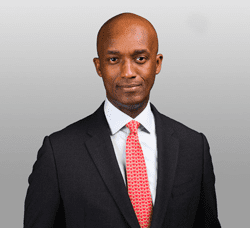The Law Preview Lawyer Roundtable Series gives you a look into the minds of diverse lawyers from across the country. Get advice on everything from your 1L year to how to leverage a mentorship opportunity in law school, and throughout your legal career.
In celebration of Black History Month, we’re highlighting seven accomplished African American lawyers in this month’s edition of the Law Preview Lawyer Roundtable Series. Check out the interview below!

Robert Kayihura
Covington & Burling, Senior Advisor for Africa
Attended the University of Washington
Tell us a little bit about you.
I started my career as a litigation associate with the Seattle law firm of Lane Powell. After four great years, I joined the Microsoft legal team with the aim to one day return home to Africa. I spent my first three years at Microsoft working on sales, marketing and IP transactions, and another two and half years in a staff attorney role supporting the general counsel and the department‚ senior leadership team on strategic legal and policy initiatives. Working with and learning from Brad Smith and his deputies is the most pivotal experience of my professional career. Emboldened with practical insight on how to help tackle some of the biggest challenges facing Africa, I jumped at the opportunity to return as director for legal and corporate affairs for Sub-Saharan Africa. After building and managing an exceptional team of colleagues, I took on another challenge as head of legal supporting Uber‚ operations across the Middle East, Africa and Pakistan. In my court role, I help lead Covington‚ public policy and global problem-solving practice for Africa, and I support some of the region‚ leading tech start-ups to address complex business problems and opportunities at the intersection of law and policy. I love my job!
Knowing what you know now about the legal profession, what advice would you give to students (particularly young men and women of color) who are about to begin their 1L year?
Two suggestions. First, please focus. You only get one chance to make the most of the opportunity. The workload is manageable, but only if you are disciplined and well-organized. Equally important is learn to work well with others. Law school is a stressful and highly competitive environment, which gives the false impression that only the super smart will succeed. I think that part of the test is whether you’ll have the wisdom to cultivate relationships of trust with faculty and classmates who will share helpful tactics and study methods that help you succeed.
In what is clearly a very impressive legal career to date, list one job, a specific project or a case you that you are most proud of, and describe why. If you can’t pick just one, it’s okay to list a few!
I am most grateful and proud that I’ve used my training and experience to return home and contribute to the transformation of Africa.
Giving back is important. Provide one organization (legal or otherwise) you have volunteered with and what made that experience so meaningful to you.
Shortly after graduating from law school, I spent three years serving on the Board of the Northwest Immigrant Rights Project in Seattle. As a first-generation immigrant from Africa, I’m indebted to the friends and advocates who worked diligently for over two years to reunite my family in the United States. I was thrilled to serve with an organization dedicated to keeping families together, protecting the people from violence, and standing up to injustice.
We all need to ask for help at some point. Did you ever ask someone to mentor or sponsor you as a law student or early-stage attorney (or have you served as a mentor)? If so, given your experience, what is your best advice for leveraging that type of relationship?
I’ve had several great mentors since law school and I still turn to them for advice. In my experience, the key to getting the most value out of a good mentor includes: 1) set your ego aside; 2) ask for honest and constructive feedback; and 3) listen and act on that feedback. I’m still working on all three points.


